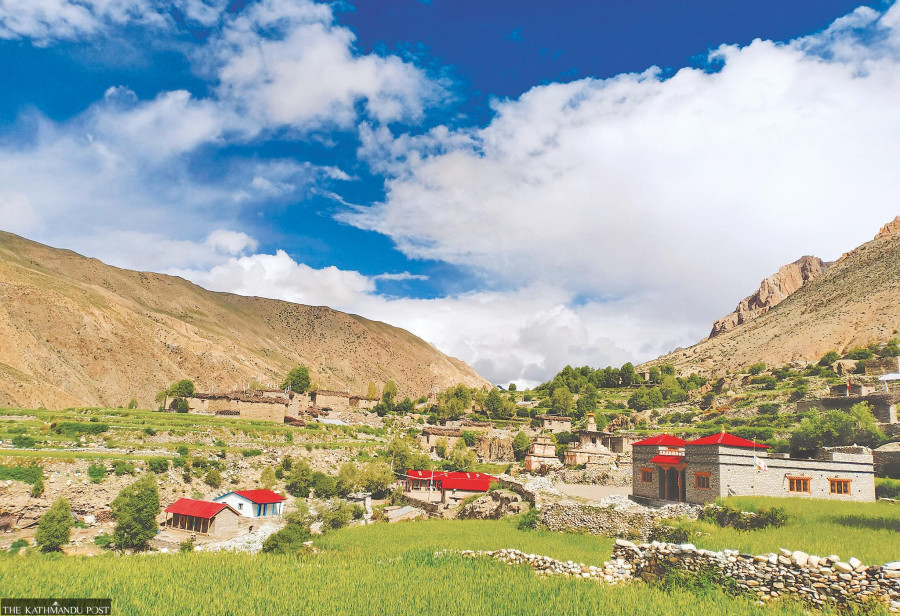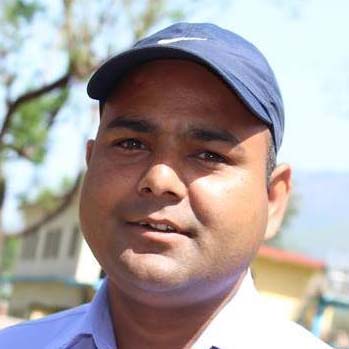National
Karnali residents have no grains ahead of festivals
Rice shortage is a perennial problem in the far-flung districts and government help is too little too late.
Krishna Prasad Gautam
Gampa Tsering Lama walked for almost a day last week to buy rice after running out of stock at home. There is a food depot in his village of Pulu in Mugamkarmarong Rural Municipality, Mugu, but it is empty.
“What is the point of having a depot in the village?” Lama asked, rhetorically. “It does not have rice when we need it. The seasonal crops we harvested have been used up and the currently planted crops are not ready.”
The depot never had rice in the rainy season, according to Lama, and he always had to trek to Chhail Bazaar to fetch it.
In the neighbouring district of Jumla, Saliman Budha of Urthuka in Chandannath Municipality went to the branch office of Food Management and Trade Company Limited in Khalanga last Sunday to buy rice. But when he reached the depot, there was no rice. Budha had no option but to buy the staple from the market at Rs80 per kg which the depot sells for Rs51 per kg.
“If we don’t get the subsidised rice, we, the poor, are forced to take out loans to cover our morning and evening meals,” Budha said.
Rice distribution has stopped at all the depots in Jumla, Humla and Mugu districts of Karnali Province as food supply at the centres has been running out. There are currently only 1,500 quintals of rice in Simkot of Humla, 500 quintals in Mugu and 275 quintals in Jumla. The available quantity is much less than what is needed in these mountain districts. The Food Management and Trade Company Limited has failed to transport rice to these districts on time.
It is mandatory to have at least 2,200 quintals of rice for distribution in Humla. In the past three fiscal years, the company has never sent rice to the mountain districts of Karnali from July to December. As a result, the residents of remote areas suffer food shortages every year.
“They should supply rice before the rainy season begins but that never happens,” said Jawahan Lama, a resident of Dolpa’s Shey Phoksundo Rural Municipality, adding the residents of the local unit have not gotten rice even during Dashain and Tihar festivals for the past five years.
When the subsidised rice did not come to the village, Lama added, the locals were forced to buy and eat rice by spending an amount ranging from Rs12,000 to 20,000 per quintal. Last year, the company sent rice to the depot in upper Dolpa only after December 3, Lama said.
According to Thorasunduk Gurung, chairman of the Shey Phoksundo Rural Municipality, the local unit produces only a little food which is not sufficient for its residents. There are about 4,700 residents in the rural municipality where rice is transported through China. China has not allowed the shipment of rice for three years citing the Covid pandemic. “Our people cannot have enough rice even during the festival,” Gurung said. “We demanded 5,000 quintals of rice in the last fiscal year but only 1,767 quintals were supplied. We don’t know how much will be supplied to our rural municipality and when.”
Soru Rural Municipality of Mugu is likewise often by food shortage. As the locally produced crops are hardly enough for three months, the locals depend on subsidised food available at the company’s food depots or buy in the local markets. Last year, the company sent 90 quintals of rice in the first phase, and 170 quintals reached the Srikot depot on December 31.
“The contractor brings rice to the depot and it all gets sold in just one or two days,” said Pahalman Shahi, a local of Soru Rural Municipality. “We never have enough to eat. In most of the villages, the locals are struggling to make it to the end of the year due to lack of food.”
Kalikot has a similar food problem. At present, 1,061 quintals of rice is in stock at the company’s branch office in the district. But the locals complain that the depot employees are refusing to provide food because they need it for emergency situations.
Mayalal BK, 61, a resident of Palata Rural Municipality-2, said that the required subsidised rice never comes to the rural municipality. “We are forced to buy rice at Rs80 per kg in the local market which would otherwise cost Rs50 per kg at the depot.”
According to BK, a food depot was set up at Thirpu for the people of Thirpu and Palata rural municipalities of Kalikot but the depot does not have subsidised rice now.
Madhav Mishra, the chief at the provincial office of the Food Management and Trade Company Limited in Surkhet, admits that food depots in various mountain districts of Karnali have been gradually running out of stock due to the delay in approving the foot quota and the tender process. According to him, the company’s Surkhet depot now has 8,200 quintals of rice in stock while Dolpa has 1,100 quintals.
“The subsidised rice transported in the last fiscal year has finished,” Mishra said. “Transport of the subsidised rice has not yet begun in the current fiscal year owing to the delay in the tender process. It will be transported soon.” According to him, three districts—Jumla, Humla and Mugu—are the hardest hit due to the shortage of subsidised rice. He assured that the company would leave no stone unturned to supply rice before Dashain.
Dashain and Tihar, two major Hindu festivals, are around the corner and the residents are worried if they will get subsidised food grains to celebrate the festivals. The Food Management and Trade Company Limited says the possibility of transporting rice to Mugu before Dashain is low as the quota of the subsidised rice for the district is yet to be approved in the current fiscal year.
“Efforts are underway to transport rice before Dashain but it will be impossible to get rice over land to Mugu unless the roads that were damaged during the rainy season are repaired soon,” said Pushkar Bham, the information officer at the Mugu branch office of the Food Management and Trade Company Limited. “All the authorities concerned and stakeholders should work together not to let the shortage of food put a damper on festivities.”
(Raj Bahadur Sahi in Mugu and DB Budha in Jumla contributed reporting.)




 8.79°C Kathmandu
8.79°C Kathmandu















